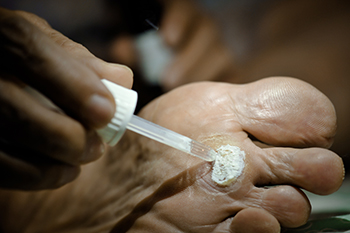
A plantar wart, which is a growth on the sole of your foot, is caused by exposure to the human papillomavirus, or HPV. Although this type of infection is more common among children and young adults, it can affect anyone. You might wonder how you end up with this unwelcome visitor. It's simple, the infection is caused by direct contact with the virus through a break in your skin. Sometimes, it can take months after exposure for a plantar wart to appear. The wart often starts as a small, rough patch on your foot's sole but can expand over time. These growths disrupt the usual skin lines on your feet and might display tiny black dots due to clogged blood vessels. Treatment options vary based on how the warts bother you. Salicylic acid treatments may or may not be effective. More advanced treatment includes the application of liquid nitrogen to freeze the skin, though this process can cause discomfort and may take several applications. If you think you may have a plantar wart, especially if it becomes painful or shows signs of infection, it is suggested that you make an appointment with a podiatrist. This qualified foot doctor can evaluate the problem and suggest a proper course of treatment.
Plantar warts can be very uncomfortable. If you need your feet checked, contact Dr. Ronald Sheppard from Warren-Watchung Podiatry Center. Our doctor will assist you with all of your foot and ankle needs.
About Plantar Warts
Plantar warts are the result of HPV, or human papillomavirus, getting into open wounds on the feet. They are mostly found on the heels or balls of the feet.
While plantar warts are generally harmless, those experiencing excessive pain or those suffering from diabetes or a compromised immune system require immediate medical care. Plantar warts are easily diagnosed, usually through scraping off a bit of rough skin or by getting a biopsy.
Symptoms
- Lesions on the bottom of your feet, usually rough and grainy
- Hard or thick callused spots
- Wart seeds, which are small clotted blood vessels that look like little black spots
- Pain, discomfort, or tenderness of your feet when walking or standing
Treatment
- Freezing
- Electric tool removal
- Laser Treatment
- Topical Creams (prescription only)
- Over-the-counter medications
To help prevent developing plantar warts, avoid walking barefoot over abrasive surfaces that can cause cuts or wounds for HPV to get into. Avoiding direct contact with other warts, as well as not picking or rubbing existing warts, can help prevent the further spread of plantar warts. However, if you think you have developed plantar warts, speak to your podiatrist. He or she can diagnose the warts on your feet and recommend the appropriate treatment options.
If you have any questions please feel free to contact one of our offices located in Marlboro and Watchung, NJ . We offer the newest diagnostic and treatment technologies for all your foot and ankle needs.
